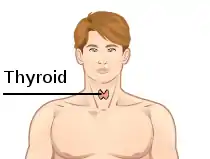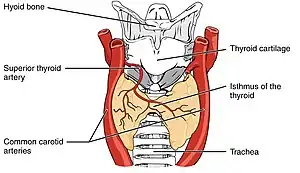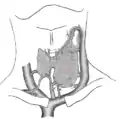Thyroid
The thyroid is one of the largest endocrine glands in the body. This gland is found in the throat. The thyroid controls how quickly the body burns energy, makes proteins, and how sensitive the body should be to other hormones.

Where the thyroid is
The principal hormones it makes are thyroxine (T4) an triiodothyronine (T3), which is more active. These hormones regulate the growth of many systems in the body. T3 and T4 are synthesised from iodine and tyrosine. The thyroid also makes calcitonin, which plays a role in calcium homeostasis.
Diseases
Hyper- and hypofunction (affects about 2% of the population)
- Hypothyroidism (underactivity) - Hypothyroidism is a condition in which the thyroid gland does not make enough thyroid hormone.

Structures near the thyroid
- Hashimoto's thyroiditis / thyroiditis
- Ord's thyroiditis
- Postoperative hypothyroidism
- Postpartum thyroiditis
- Silent thyroiditis
- Acute thyroiditis
- Iatrogenic hypothyroidism
- Hyperthyroidism (overactivity)
- Thyroid storm
- Graves-Basedow disease
- Toxic thyroid nodule
- Toxic nodular struma (Plummer's disease)
- Hashitoxicosis
- Iatrogenic hyperthyroidism
- De Quervain thyroiditis (inflammation starting as hyperthyroidism, can end as hypothyroidism)
Anatomical problems
- Goitre
- Endemic goitre
- Diffuse goitre
- Multinodular goitre
- Lingual thyroid
- Thyroglossal duct cyst
Tumors
- Thyroid adenoma
- Thyroid cancer
- Papillary
- Follicular
- Medullary
- Anaplastic
- Lymphomas and metastasis from elsewhere (rare)
Deficiencies
- Cretinism
Additional images
 Sagittal section of nose mouth, pharynx, and larynx.
Sagittal section of nose mouth, pharynx, and larynx. Diagram showing common arrangement of thyroid veins.
Diagram showing common arrangement of thyroid veins. Section of thyroid gland of sheep. X 160.
Section of thyroid gland of sheep. X 160. Thyoid histology
Thyoid histology
Related pages
Other websites
- American Thyroid Association (Thyroid Information and professional organization)
- New Management Guidelines for Patients with Thyroid Nodules and Differentiated Thyroid Cancer from the American Thyroid Association Taskforce.
- Thyroid Disease Manager (free online textbook)
- Thyroid Disease (Nuclear Medicine Information)
- The Thyroid Foundation of America (Education about Thyroid Disease)
| Endocrine system |
| Adrenal gland - Corpus luteum - Hypothalamus - Ovaries - Pancreas - Parathyroid gland - Pineal gland - Pituitary gland - Testes - Thyroid gland - Hormone |
This article is issued from Wikipedia. The text is licensed under Creative Commons - Attribution - Sharealike. Additional terms may apply for the media files.